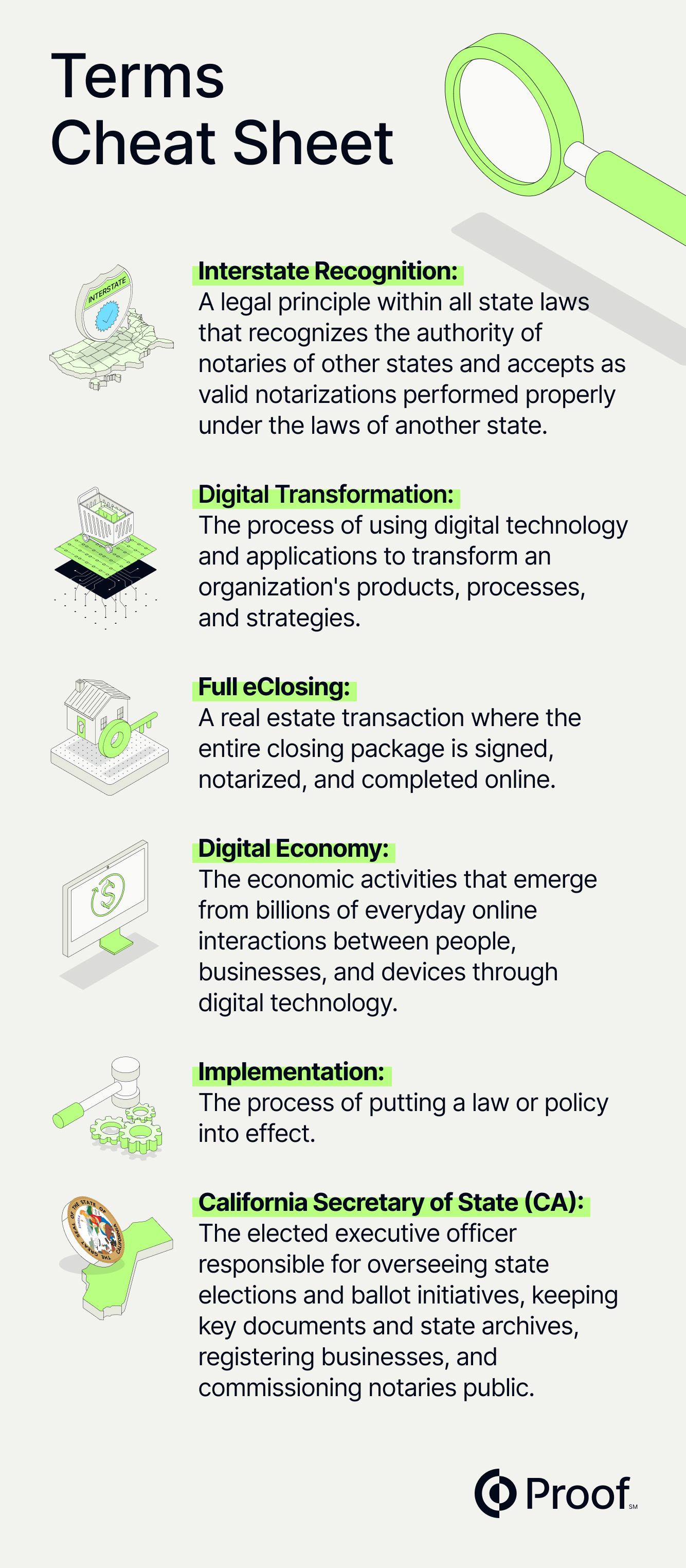Open for Business: Everything you need to know about California’s new online notarization law

The acceleration of digital transformation has fundamentally changed how people, businesses, and communities connect. Technology has made it possible to do almost anything from a smartphone — from starting your car and seeing who’s at your front door to receiving medical care and getting emergency alerts. With the digital world at our fingertips, it’s difficult to imagine what life was like before. In time, written mail became emails, phone calls became text messages, meetings became Zoom calls, and paper and pens became electronic documents. The evolution of notarization proved to be no different.
Over the past decade, millions of people and businesses have turned to online notarization as a means to get their most important documents signed and verified in minutes. What was once a long-drawn-out process has become one that’s more convenient, cost-effective, and secure than ever before. Most recently, California became the latest state to make legislative progress which will fully open its doors to the next phase of digital commerce.
Here’s everything you need to know about California’s online notarization law.

What's the timing?
In comparison to the states that came before, California took a unique approach to online notarization legislation — naturally, this means that the implementation timeline will look different, too.
For consumers, the benefits are imminent. However, greater patience will be required of notaries as the California Secretary of State takes the necessary steps towards complete implementation of the law.
Effective January 1, 2024, California’s existing interstate recognition laws will provide greater consistency and clarity across all 50 states, which will make it easier for consumers to buy and sell their homes online.
The complexity of California’s online notarization law warrants an extended period of time for the Secretary of State to build the necessary infrastructure and regulatory framework for onboarding notaries and their platforms of choice. Although the timeline for project completion and implementation is unclear, we continue to work closely with the Secretary on delivering a solution for California notaries as quickly as possible.
Why does it matter?
Those who have been with us since the beginning know that it’s been over a decade since the first state — Virginia — implemented online notarization. Over 40 states have since followed suit, including some of the largest in scale: New York, Texas, and Florida. Often at the helm of innovation and digital transformation, California has added a long overdue notch in the belt of online notarization expansion with its recent legislative action. Although each state expansion milestone along the way has been important, California is momentous in scale with the largest economy, real estate market, and population in the country. Digitizing this corner of the market creates long-lasting impact and limitless opportunity across the Golden State.
Specific to the real estate industry, California’s online notarization law will provide clarity for underwriters and lenders to make Full eClosing — which has already been widely successful in other states — more widely available for homebuyers and sellers. Meaning, they can close entirely online.
We’ve received a ton of interest from our real estate partners; everyone is eager to make eClosing solutions available for Californians immediately on January 1st. Fear not, we’ll be sharing more in the weeks to come on how industry professionals can make the most of this opportunity.
P.S. More of a podcast person? We’ve got you covered. Soon after California’s online notarization law was made official, Proof founder and CEO Pat Kinsel joined HousingWire to share more about its impact on real estate and how his company would be able to contribute to it.
What impact will it have?
The longer-term impact of California’s online notarization law will span far beyond the benefits it’ll bring to Real Estate and notaries. Among other things, it’ll be a catalyst for crucial change as it pertains to both equity and sustainability.
Equity:
Whether it be closing on your first home or making critical life decisions about the medical care of a loved one, many of life’s most important moments are accompanied by the need to access a notary public — easily, quickly, and safely. However, research from the Urban Institute finds that despite being the largest state by population, California is among the least equitable when it comes to access to notaries with a per capita rate of just 3 notaries for every 1,000 people. For those who live in low-income or rural areas, the statistics are even more staggering:
- Wealthier areas have 7X the number of notaries per capita than the lowest-income areas of the state; and,
- The average number of notaries per capita in urban areas is more than 3X that of rural areas.
Once fully implemented, California’s online notarization law will allow notaries to broaden their reach within the digital economy and serve more of the state’s residents — regardless of geographic location or income status — simply by expanding their business offerings to include online notarization.
Sustainability:
In 2006, the Golden State became the first in the country to set a broad, statewide limit on greenhouse gas emissions (GHG) — jumpstarting its long-standing position as a pioneer for clean tech innovation and environmental sustainability. Just recently, the state also committed to 100% renewable energy by 2045, a mission that online notarization will help make possible.
In examining the environmental impact of the Proof℠ (formerly Notarize) platform, Bridgespan found that digitizing all notarizations would lead to:
- A 10% decrease in printing on a per-notarization basis
- A reduction of 1.9 Kg of GHG emissions per-notarization in e-commerce transactions
- A reduction of 2.3 Kg of GHG emissions per-notarization in business transactions
- A staggering 9.8 Kg reduction of GHG emissions per-notarization for real-estate transactions
To put it into perspective, the environmental impact would be the equivalent of removing the emissions of 800K gas-powered cars per year (3.7M metric tons GHG) or those emitted by the entire city of Paris (~3.4M metric tons GHG).
-
The implementation of California’s online notarization law will be set in motion on January 1, bringing immediate — and enormous — benefits for those in the real estate industry. In tandem with the projected revival of the housing market and California’s size and scale, 2024 will be the year of opportunity for real estate.
The Golden State is open for business — and it's better than ever before.
Have additional questions you'd like answered? Tell us here.














.png)


.jpg)

















.jpg)










%25202.jpeg)






































